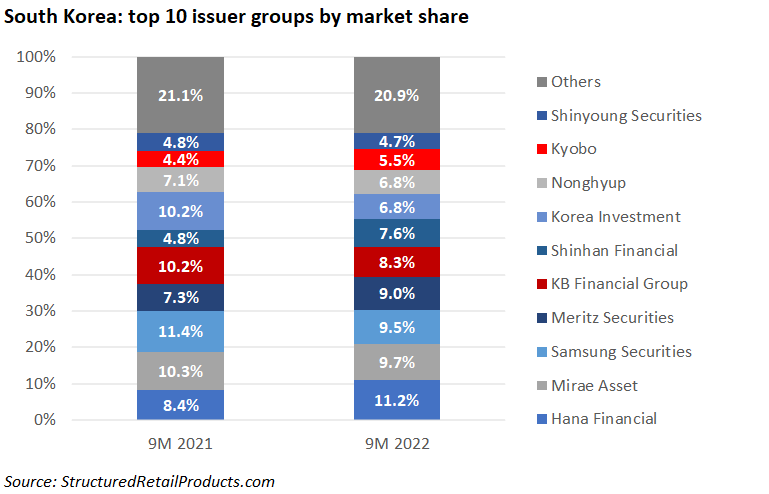The Korean market showed its competitive side with the top five issuer groups separated by only 2.81 percentage points in 9M 2022.
Some KRW41.9 trillion (US$33.3 billion) was gathered from 13,463 structured products (excluding flow- and leverage) in the first nine months of 2022 – down 31% by sales volumes year-on-year (9M 2021: KRW60.4 trillion from 14,734 products).
Approximately 88% of total sales was gathered from 10,070 products targeted at retail investors with the remaining volumes coming from private placements.
Twenty-five issuer groups – mainly local securities houses – were active during the period (9M 2021: 24).
Hana Financial was the number one provider with an 11.2% share of the market – up 2.8% from the prior year period when it finished just outside the top five. The company collected KRW4.7 trillion from 1,084 products with the bulk of its volumes, at KRW2.4 trillion and KRW1.9 trillion, respectively, coming from structures linked to a basket of indices and the interest rates.
Mirae Asset and Samsung Securities – in second and third place, with a market share of 9.7% and 9.5%, respectively – both saw a YoY decline in sales.
The former was behind the best-selling product for the period, which came in the shape of Mirae Asset ELB 2873. The one-year fully protected digital was linked to a worst-of basket comprising the share of Samsung Electronics and the Kospi 200 index. It sold KRW822.35 billion during its subscription period.
Samsung’s offering (1,317 products) was almost exclusively equity-linked, although it did also collect KRW962 billion from 178 credit-linked notes.
Meritz increased its market share to nine percent (+1.7% YoY) while KB Financial, which completed the top five, captured 8.3% of the Korean market (-1.9%).
Kiwoom’s New Global 100tr Club ELS 403 achieved the highest performance. The one-year autocall, linked to the shares of Tesla and Advanced Micro Devices, knocked out at the first time of asking (after three months) returning 108.70% of the nominal invested (36.44% pa). Goldman Sachs International was the derivatives counterparty.

